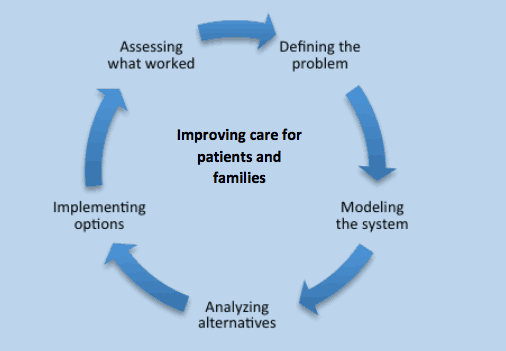I recently saw a tweet that referenced a May 2014 that was sent to President Obama and his administration: “Report to the President – Better HealthCare and Lower Costs: Accelerating Improvement Through Systems Engineering.”
The report was written by the “President's Council of Advisors on Science and Technology,” or PCAST, and a working group that includes professors, business leaders, and healthcare leaders – including a few names that would probably be familiar to readers of this blog:
- Eric Schmidt, Chairman, Google
- James P Bagian, Director, Center for Healthcare Engineering and Patient Safety, University of Michigan (and former astronaut)
- Gary S. Kaplan, MD, Chairman and CEO, Virginia Mason Health System
A main problem statement in the report is a familiar one:
Health-care costs now approach a fifth of the U.S. economy, yet a significant portion of those costs is reportedly “unnecessary” and does not lead to better health or quality of care. Millions more Americans now have health insurance and therefore access to the health care system as a result of the Affordable Care Act (ACA). With expanded access placing greater demands on the health-care system, strategic measures must be taken not only to increase efficiency, but also to improve the quality and affordability of care.
Lean Requires Payment Reform
The report brings up a point often written about and talked about by John Toussaint, MD and his ThedaCare Center for Healthcare Value – that we need payment reform in additional to the redesign of care delivery through Lean. The fee-for-service payment mechanisms are pointed to as a major barrier to systems engineering and improvement:
The predominant fee-for-service payment system is the primary barrier to greater use of systems methods and tools in health care, as it serves as a major disincentive to more efficient care.
I've been to a number of hospitals in the last 18 months where executives said that they could reduce readmission rates quickly (using Lean)… but the problem is that they would really hurt themselves financially or even drive themselves into bankruptcy (maybe there was a bit of hyperbole, but they said it). Sure, there are penalties from CMS if your readmission rates are too high… but if you drive the readmission rates much lower than that penalty threshold (which would be good for the patient), then that would be very bad for the hospital. There's not a good alignment of incentives, to say the least.
What the Report Says About Lean
There are many different mentions of Lean in the report.
The first reference is a mention of Lean as one of many systems engineering tools, including human-factors engineering, and statistical process control (I'm teaching a class on SPC in January, by the way).
The report shows an iterative model of systems engineering that is reminiscent of PDSA and DMAIC:

The report cites the example of Denver Health and how they have improved quality and patient safety while saving more than $200 million in the process.
The Lean techniques have helped the organization achieve specific successes–such as reducing two serious conditions (deep-vein thrombosis and pulmonary embolism) by 80 percent and by halving the time needed to prepare a hospital room for the next patient. On a broader scale, Denver Health has saved almost $200 million since it began its work in 2006 and reduced its mortality rate to some of the lowest among its peers in academic health centers. It has achieved these successes while seeing a 60 percent increase in uncompensated care, illustrating the wide range of organizations that could take advantage of these approaches.
The authors also mention “Lean techniques for eliminating waste in workflows and clinical processes” as a countermeasure to provider stress and other problems in small clinical practices (not just large hospitals).
The report's glossary defines Lean as (click for a larger view):
I'm glad that their definition includes Lean as a “holistic approach” and a “system,” not just tools. Just as the Institute of Medicine called for continuously learning and continuously improving organizations (through Lean), the PCAST report recognizes that same potential – not just improvement, but learning.
I wish they didn't just label “Kaizen” as events… the practice of daily Kaizen (daily continuous improvement) is critical too (as Joe Swartz and I have written about). Events are great, but they're not the only way to improve.
The report did sort of botch the definition of “Lean Six Sigma” a bit:
Six Sigma has advanced statistical methods that can be a helpful complement to Lean. But to say (or imply) that Six Sigma is the only methodology with “problem-solving tools” is not correct. Lean and Six Sigma can co-exist, but Lean brings many simple, yet effective, problem solving tools and mindsets to the game.
Oh well.
So, this nice report has been written… I guess the question remains: what will it accomplish?
What do you think? Please scroll down (or click) to post a comment. Or please share the post with your thoughts on LinkedIn – and follow me or connect with me there.
Did you like this post? Make sure you don't miss a post or podcast — Subscribe to get notified about posts via email daily or weekly.
Check out my latest book, The Mistakes That Make Us: Cultivating a Culture of Learning and Innovation:











